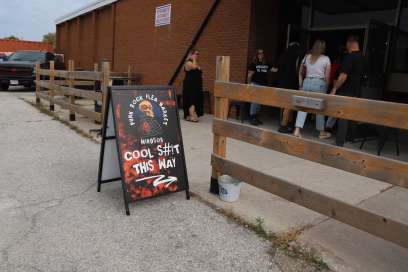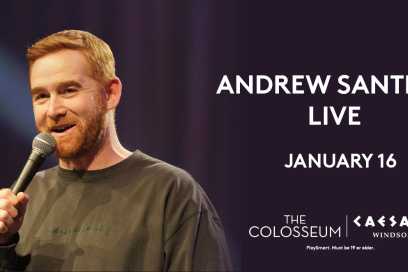Post Productions Confronts Controversial Topic With Empathy
Monday February 19th, 2024, 10:00am
Hello time traveller!!
This article is 576 days old.
The information listed below is likely outdated and has been preserved for archival purposes.
Covering a controversial topic, a local theatre company is doing so with empathy.
Starting Friday February 16th, Post Productions will present a double bill of The Event by John Clancy and Sarah Kane’s 4.48 Psychosis. Taking place at the Shadowbox Theatre (located at 103b – 1501 Howard Avenue) the three week run puts a spotlight on mental health, suicide and presents them from a different perspective.
Despite producing two shows, the idea came from a desire to stage all of Kane’s scripts.
“We want to produce all of Sarah Kane’s plays, and that desire became even stronger after the experience we had with Blasted back in 2021,” said producer and director, Michael K. Potter. “We knew then that the next Kane play that we would produce would probably be either 4.48 Psychosis or Crave. Since we just watched an excellent production of Crave from England that was made available online though, we thought we might be too influenced by it if we produced Crave first. So I’d say we’ve known for two-and-a-half years that we were going to produce 4.48 Psychosis. I really started working on it and envisioning what I wanted it to be two-years ago.”
Set as a one act play, 4.48 Psychosis tells the story of a woman who has resolved to commit suicide at 4:48am. As time counts down, she’s revisited by past moments and speaks with other voices about feeling misunderstood her entire life. It’s a play that’s gained notoriety since Kane herself committed suicide before it was staged for audiences.
With an unfiltered view of mental health, this controversy has only continued.
“It seems obvious to me why 4.48 Psychosis is controversial and I don’t see that as something to argue against,” said Potter. “It’s controversial because it’s about suicide and [Kane] committed suicide shortly before the first production of the play opened. It’s about her life so this is one of those rare situations where it really doesn’t make sense to separate the art from the artist. I suppose it’s also controversial for the reasons that all of her plays are controversial, which is that it deals with difficult subject matter in an absolutely open, unfiltered, direct and courageous manner.”
Upon deciding to produce 4.48 Psychosis, Fay Lynn was cast in the lead role. Considered the best actor in Windsor-Essex by Potter, she’d also never took part in one of Kane’s plays. Beyond that, the production has been presented in many forms — some have been one-woman shows and others have had up to six actors featured. Given their undefined nature, Potter settled on three: Lynn and two cast mates playing characters from the woman’s life or voices in her head. With that framework, the director assigned lines to his three actors and focused on assisting audiences. In addition, Potter looked to convey each theme in the most powerful way possible.
From there, casting and auditions for the one act play were fairly short and straight forward.
“The Voices were auditioned and cast in December and we started rehearsing before Christmas,” said Potter. “It was one of the best audition experiences we had because so many ridiculously talented people showed up, giving us a lot of different interpretations and angles to choose from. After narrowing finalists down to four actors we ended up deciding that any of the four would be excellent, so we cast the roles based on contrast and balance.”
Even so, one cast member had to drop out five weeks before opening night. This left everyone feeling anxious over finding someone to come through with such limited rehearsal time. Luckily, Maggie Marchenkowsky and Courtesy Lebert improved the play, bringing their own ideas and interpretations to the show.
Another big part of the double bill was picking a play to compliment 4.48 Psychosis. Finding something with similar themes, it was also important to maintain the integrity and individuality of both shows. In the end, it’s what allows audiences to have a cohesive experience.
Given the heavy subject matter being covered though, it was no easy task.
“Last summer [Clancy] sent us a copy of his script for The Event, which has never been published, even though it’s been produced and performed all around the world and has won several awards,” said Potter. “At the time we received the script, we were drowning in work and had a backlog of scripts people had sent us that we still hadn’t read. So we didn’t actually get around to reading The Event until shortly after New Year’s Day of this year. Let me tell you, that turned out to be a pretty memorable day.”
Lynn and the director were excited about the one act play. Both were only halfway done the script when deciding in their minds they wanted to produce it. Upon finishing, they agreed it was among the best they’d ever read.
It was also a show that fell into their laps at the perfect time.
“We’d coincidentally been looking for a one-act play to pair with 4.48 Psychosis but hadn’t found anything suitable,” said the director. “Time was running out, so it felt like the gods had dropped this into our lives to rekindle our love of theatre and solve the problem we were facing.”
Deciding on The Event six-to-seven weeks before opening 4.48 Psychosis, Post couldn’t hold an open audition. Knowing how complex the script was, those involved had to bring in someone they could trust to handle the material. Although Potter hadn’t worked with him before, he’d seen Heath Camlis in several productions. Lynn had also worked with him on a film briefly and directed the actor in The Yellow Wallpaper for Windsor Feminist Theatre (WFT.) Following her judgement, the director had Camlis take on the responsibility.
Once decided, Potter had to create the right tone from these specific plays. While both are intense stories balanced by dark humour, 4.48 Psychosis leans heavier due to its focus on suicide. It left the company working through the dramatic overlap between both shows. Wanting to emphasize it, the goal was to create a rollercoaster experience for audiences.
It’s also why Potter put The Event up front in Post’s double bill.
“Clancy’s script does an excellent job of putting people in a frame of mind that makes them more open to empathy,” he said. “The Event breaks down barriers between people. It helps us focus on things we all have in common, things that are often painful but also beautiful. I needed the audience to have gone through the experience of The Event before seeing 4.48 Psychosis so they’d be better positioned to understand what Kane is trying to do and say. She wrote 4.48 Psychosis about herself, more or less, as a person who had spend much of her life feeling suicidal and who had made the decision to end her life. What she wanted was for people to understand her perspective on why this was the right choice – even if they disapprove of it or think what she did was wrong.”
As far as how to describe the first play however? Potter hasn’t quite figured it out.
“The Event is a very difficult play to describe,” said the director. “I’m not sure I’ve figured out how to describe it in a way that does justice to the script and also makes sense to people. Thematically, I guess you could say that The Event is about what it is to live, the commonalities we all share as human beings trying our best to live in the world and how one of those commonalities is that the world can bring us down in various ways. This includes loneliness, confusion, the feeling of not belonging in one’s own time and anxiety. The Event is thematically similar to 4.48 Psychosis in this way, but whereas the Woman in 4.48 Psychosis can’t find a way out of her predicament, the Man in The Event can.”
For Post, it was also important to approach mental health from a personal perspective. Not using a clinical view, the double bill instead focuses on how people can help by simply listening.
Despite this, 4.48 Psychosis doesn’t overstate the topic either.
“[Kane] thankfully never punches the audience in the face with her themes,” said Potter. “She was too smart and too gifted to write stories in which characters have conversations about the actual theme or state it directly, which are problems we often find with lesser playwrights. She challenges and trusts the artists who work with her scripts to figure out what she’s saying by reflecting on how all of the pieces fit together. So in the case of 4.48 Psychosis the picture those pieces create when they’re examined closely, the pattern we find is that this is a story of a woman who has never really felt understood. She’s someone who believes she’s only seen and heard superficially, struggling with something so complex and all-encompassing that the only way people can understand is for them to take the time to shut up, listen and think.”
Having struggled with mental health, Lebert wishes this approach was more common as well.
“4.48 Psychosis doesn’t treat suicide like a plot point or a cliche,” said the actor. “It is very much an intensely cerebral portrayal from the perspective of the person contemplating the act of suicide, which I think is rare to find in any contemporary media. It’s like suicide is only okay if it is used as a plot device rather than seeing it for what it is: a tragedy.”
Presented in association with WFT, The Event and 4.48 Psychosis will be staged at the Shadowbox Theatre on February 16th, 17th, 22nd, 23rd, 24th, 29th, March 1st and 2nd. All performances start at 8:00pm with doors opening at 7:30. Tickets are $25 each and can be purchased online. Any remaining seats will also be available at the venue. Post warns that both shows are for mature audiences and recommends that people who may be triggered research them before attending.
Still, Potter doesn’t want the label to scare audiences away either.
“Both of these plays are a lot funnier than anyone will expect them to be,” he said. “We’re really not interested in dour for dour’s sake; we always try to find as much humour as we can in even the most serious stories. Thankfully, both [Clancy] and [Kane] have dark twisted senses of humour quite akin to ours.”
Lebert also hopes the double bill unites audiences who come out for the experience.
“Both these plays, in my perspective at least, are meta commentaries on institutions,” said the actor. “Whether they be psych wards or the stage as a whole. My hope is to bring people together with a sense of connection, that something resonates deep within them when they see these plays. My hope is to let people see a part of themselves in the characters and in doing so, create a sense of unity amongst strangers.”
























